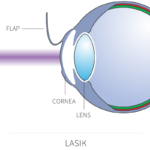
Laser eye surgery has become a popular method for vision correction, offering long-term benefits that can greatly improve the quality of life for individuals with vision problems. Understanding the procedure, the immediate aftermath and the potential risks and complications is crucial for anyone considering this life-changing surgery. Additionally, comparing laser eye surgery with other vision correction methods can help potential patients make an informed decision.
Understanding Laser Eye Surgery
Laser eye surgery is a procedure that uses a laser to reshape the cornea, the transparent front part of the eye, to improve vision. It is primarily performed to correct common vision problems such as nearsightedness (myopia), farsightedness (hyperopia), and astigmatism. By altering the curvature of the cornea, the surgery allows light to focus directly on the retina, resulting in clearer vision.
What is Laser Eye Surgery?
Laser eye surgery, also known as refractive surgery, is a precise and effective method for correcting vision problems. It is a minimally invasive procedure that is typically performed on an outpatient basis. The surgeon uses a laser, known as an excimer laser, to reshape the cornea, thereby changing its focusing power.

During the surgery, the patient is positioned comfortably, and numbing eye drops are applied to ensure their comfort throughout the procedure. The surgeon then uses a device called a microkeratome or femtosecond laser to create a thin flap on the cornea. This flap allows access to the underlying tissue that will be reshaped.
Once the cornea is ready for reshaping, the excimer laser is used to remove a small amount of tissue from specific areas of the cornea. The laser works by emitting a cool ultraviolet light beam that precisely vaporizes the tissue, without generating heat or causing damage to the surrounding area. This reshaping process is customized to each patient’s unique prescription, ensuring optimal visual outcomes.
The Procedure of Laser Eye Surgery
The laser eye surgery procedure typically begins with the application of numbing eye drops to ensure the patient’s comfort during the surgery. Next, a device called a microkeratome or femtosecond laser creates a thin flap on the cornea. The surgeon then uses the excimer laser to reshape the cornea by removing a small amount of tissue. Once the cornea has been reshaped, the flap is repositioned and left to heal naturally.
After the surgery, patients are provided with protective shields to wear over their eyes to prevent accidental rubbing or touching. It is important to follow post-operative instructions, which may include using prescribed eye drops to aid in the healing process and prevent infection. Most patients experience improved vision within a few days, with complete recovery usually achieved within a few weeks.
While laser eye surgery is a highly effective procedure, it is important to note that not everyone is a suitable candidate. Factors such as age, overall eye health, and the stability of the patient’s prescription are considered during the pre-operative evaluation. A comprehensive examination by an experienced eye surgeon is necessary to determine if laser eye surgery is the right option for an individual.
In conclusion, laser eye surgery is a remarkable advancement in the field of ophthalmology, offering a safe and effective solution for vision correction. By reshaping the cornea, this procedure provides patients with the opportunity to reduce or eliminate their dependence on glasses or contact lenses, ultimately improving their quality of life.
The Immediate Aftermath of Laser Eye Surgery
While laser eye surgery offers significant long-term benefits, it is important to understand what to expect immediately after the procedure. Post-surgery care and potential short-term side effects play a crucial role in the recovery process.

Once the laser eye surgery is complete, patients are often filled with a mix of excitement and anticipation. The immediate aftermath of the procedure can be a bit overwhelming, as the eyes adjust to the changes that have taken place. However, with proper post-operative care and an understanding of the potential short-term side effects, patients can navigate this phase of recovery with confidence and ease.
Post-Surgery Care
After laser eye surgery, it is essential to follow the post-operative instructions provided by the surgeon. These instructions may include using prescribed eye drops, avoiding strenuous activities, and protecting the eyes from irritants such as dust and wind. Additionally, it is crucial to refrain from rubbing or touching the eyes, as this can interfere with the healing process. read some more post surgery tips by clicking here
During the initial hours and days following the surgery, the eyes may feel slightly uncomfortable and sensitive. This is completely normal and can be managed with the help of prescribed pain medication or over-the-counter remedies recommended by the surgeon. It is important to rest and give the eyes ample time to heal, avoiding activities that may strain the eyes or increase the risk of infection.
Regular follow-up appointments will also be scheduled to monitor the healing process. These appointments allow the surgeon to assess the eyes’ progress and address any concerns or questions that the patient may have. It is crucial to attend these appointments and communicate openly with the surgeon to ensure a smooth recovery.
Short-Term Side Effects
While most individuals experience improved vision shortly after laser eye surgery, it is common to experience some short-term side effects. These can include temporary dryness, sensitivity to light, and mild discomfort. These side effects occur as the eyes adjust to the changes made during the surgery and the healing process begins.
Temporary dryness is a common side effect that occurs as the eyes adapt to the new corneal shape. This dryness can cause a gritty or foreign body sensation, making it important to use the prescribed eye drops to keep the eyes lubricated. It is crucial to follow the recommended dosage and frequency of the eye drops to promote optimal healing.
Sensitivity to light, known as photophobia, is another short-term side effect that many patients experience. The eyes may become more sensitive to bright lights or glare, making it necessary to wear sunglasses or protective eyewear when outdoors. This sensitivity usually subsides as the eyes continue to heal and adjust to the new visual acuity.
Mild discomfort, such as a burning or itching sensation, is also common after laser eye surgery. This discomfort can be managed with over-the-counter pain relievers or prescribed medication, as recommended by the surgeon. It is important to avoid rubbing or touching the eyes, as this can exacerbate the discomfort and potentially delay the healing process.
It is important to note that these side effects usually subside within a few days or weeks, as the eyes heal and adjust to the changes made during the surgery. If any concerns or unusual symptoms arise, it is crucial to contact the surgeon immediately for guidance and reassurance.
Long-Term Benefits of Laser Eye Surgery
One of the primary reasons individuals opt for laser eye surgery is the long-term benefits it offers. These benefits can positively impact various aspects of life, including visual acuity, freedom from corrective eyewear, and overall quality of life.
Improved Visual Acuity
One of the most significant long-term benefits of laser eye surgery is improved visual acuity. Many individuals experience a significant reduction in their dependence on corrective eyewear, allowing them to see clearly without the need for glasses or contact lenses. This improvement in visual acuity can enhance everyday activities such as reading, driving, and participating in sports.
Imagine waking up in the morning and being able to see the world around you with crystal clarity. Laser eye surgery can provide this incredible gift. By reshaping the cornea, the surgery corrects refractive errors, such as nearsightedness, farsightedness, and astigmatism. As a result, patients often achieve 20/20 vision or even better, allowing them to appreciate the fine details of their surroundings.
With improved visual acuity, individuals can confidently navigate their daily lives without the constant reliance on glasses or contact lenses. They can enjoy the beauty of nature, appreciate art, and read books without any visual barriers. Laser eye surgery opens up a world of possibilities, where everything appears vivid and clear.
Freedom from Corrective Eyewear
For many people, the freedom from wearing glasses or contact lenses is a life-changing benefit. Laser eye surgery can eliminate the need for these corrective measures, allowing individuals to enjoy clear vision without the hassle and expense associated with eyewear. This newfound freedom can boost self-confidence and make daily life more convenient.
Think about all the inconveniences that come with wearing glasses or contact lenses. The constant need to clean them, the risk of misplacing them, and the discomfort they can cause after extended wear. Laser eye surgery provides a permanent solution to these inconveniences, giving individuals the freedom to live their lives without the burden of corrective eyewear.
With laser eye surgery, individuals no longer have to worry about their glasses fogging up in cold weather or their contact lenses causing irritation. They can engage in activities like swimming, hiking, or playing sports without the fear of losing or damaging their glasses. The convenience of not having to carry around spare contact lenses or a glasses case is liberating.
Increased Quality of Life
Having good vision is essential for a high quality of life. Laser eye surgery can significantly improve an individual’s visual capabilities, leading to increased independence and confidence. Whether it’s being able to fully enjoy outdoor activities without worrying about glasses or participating in professional endeavors that require optimal vision, the overall quality of life can be greatly enhanced.
Imagine the joy of waking up in the morning and being able to immediately see the world around you without reaching for your glasses or putting in your contact lenses. Laser eye surgery can provide this newfound freedom, allowing individuals to fully embrace every moment of their lives.
With improved vision, individuals can confidently pursue their passions and hobbies. They can engage in activities that require excellent visual acuity, such as photography, painting, or playing musical instruments. Whether it’s capturing the beauty of a sunset or reading sheet music with ease, laser eye surgery opens up a world of possibilities.
Furthermore, laser eye surgery can have a positive impact on an individual’s professional life. Clear vision is crucial in many careers, such as pilots, surgeons, or artists. By eliminating the need for corrective eyewear, laser eye surgery can enhance job performance and open up opportunities for career advancement.
Overall, laser eye surgery can transform not only the way individuals see the world but also how they experience life. The long-term benefits of improved visual acuity, freedom from corrective eyewear, and increased quality of life make laser eye surgery an appealing option for those seeking a permanent solution to their vision problems.
Potential Risks and Complications
While laser eye surgery offers numerous benefits, it is important to be aware of the potential risks and complications associated with the procedure. Understanding these risks and learning how to mitigate potential complications is essential for making an informed decision.
Understanding the Risks
Laser eye surgery, like any surgical procedure, carries inherent risks. While it is considered safe and effective, complications can occur, albeit rarely. These risks may include infection, corneal scarring, dry eye syndrome, and temporary or permanent changes in vision. It is vital to consult with a qualified ophthalmologist and discuss potential risks before proceeding with the surgery.
How to Mitigate Potential Complications
While the potential for complications exists, there are steps individuals can take to reduce the likelihood of experiencing any adverse effects. It is crucial to choose an experienced and reputable surgeon who will carefully evaluate your candidacy for the procedure. Adhering to post-operative care instructions, attending follow-up appointments, and maintaining good eye hygiene are also vital in mitigating potential complications.
Comparing Laser Eye Surgery with Other Vision Correction Methods
When considering vision correction, it is essential to compare laser eye surgery with other available options such as glasses and contact lenses. Understanding the advantages and limitations of each method can help individuals make an informed decision.
Laser Eye Surgery vs. Glasses
While glasses are a common method of correcting vision, they do have limitations. Glasses can be misplaced, broken, or simply become an inconvenience for some individuals. Laser eye surgery provides a long-term solution by correcting the underlying issues that cause dependence on glasses.
Laser Eye Surgery vs. Contact Lenses
Contact lenses provide an alternative to glasses but require ongoing maintenance and care. Additionally, some individuals may experience discomfort or infections from wearing contact lenses. Laser eye surgery eliminates the need for contact lenses and provides a permanent solution for improved vision.In conclusion, laser eye surgery offers significant long-term benefits for individuals seeking vision correction. By understanding the procedure, the immediate aftermath, and the potential risks and complications, individuals can make an informed decision regarding their eye health. Comparing laser eye surgery with other vision correction methods can further aid in the decision-making process. Ultimately, the long-term benefits of improved visual acuity, freedom from corrective eyewear, and an increased overall quality of life make laser eye surgery a viable option for those seeking a life-changing solution to their vision problems.





